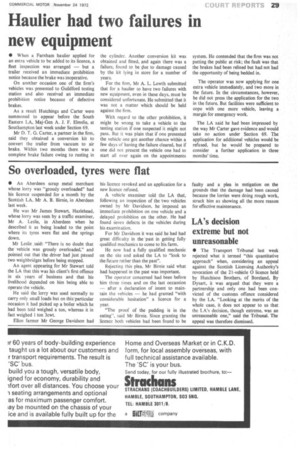So overloaded, tyres were flat
Page 31

If you've noticed an error in this article please click here to report it so we can fix it.
• An Aberdeen scrap metal merchant whose lorry was "grossly overloaded" had his licence suspended for a month by the Scottish LA, Mr A. B. Birnie, in Aberdeen last week.
He was Mr James Stewart, Hazlehead, whose lorry was seen by a traffic examiner, Mr A. Leslie, in Aberdeen when he described it as being loaded to the point where its tyres were flat and the springs down.
Mr Leslie .said: "There is no doubt that the vehicle was grossly overloaded," and pointed out that the driver had just passed two weighbridges before being stopped.
An agent appearing for Mr Stewart told the LA that this was his client's first offence in six years of business and that his livelihood depended on him being able to operate the vehicle.
He said the lorry was used normally to carry only small loads but on this-particular occasion it had picked up a boiler which he had been told weighed a ton, whereas it in fact weighed 1 ton 3cwt.
Ellon farmer Mr George Davidson had his licence revoked and an application for a new licence refused.
A vehicle examiner told the LA that, following an inspection of the 'two vehicles owned by Mr Davidson, he imposed an immediate prohibition on one vehicle and a delayed prohibition on the other. He had found ieven defects in the vehicles during his examination.
For Mr Davidson it was said he had had great difficulty in the 'past in getting fully qualified mechanics to come to his farm.
He now had a fully qualified mechanic on the site and asked the LA to "look to the future rather than the past".
Rejecting this plea, Mr Birnie said what had happened in the past was important.
The operator concerned had been before him three times and on the last occassion
after a declaration of intent to maintain the vehicles — he had granted "with considerable hesitation" a licence for a year.
"The proof of the pudding is in the eating", said Mr Birnie. Since granting the licence both vehicles had been found to be faulty and a plea in mitigation on the grounds that the damage had been caused because the lorries were doing rough work, struck him as showing all the more reason for effective maintenance.












































































































